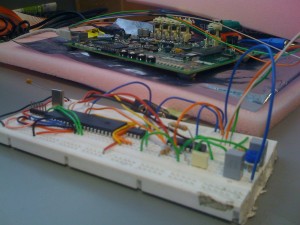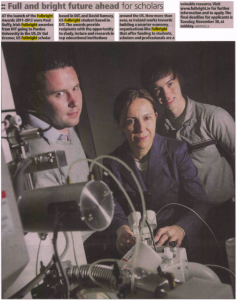David spent the year after graduation at the Dublin Institute of Technology sponsored by a Fulbright Scholarship. As part of the Biomedical and Audio research groups, he worked to make the guitar easier to play for people with disabilities using DSP techniques.

The concept for David’s work was inspired by a literature review of musical expression. The device should (1) follow principles of universal design, and (2) give the opportunity to have an embodied musical experience. Much of the current technology targeted for disabled populations fail to meet the criteria for complete musical expression, and thus fall closer to musical toys than instruments.
The prototype David built worked with any electric guitar once it is properly retuned. The DSP did the work of the guitarist’s fretting hand, keeping track of the last several notes played and, based on probability, mapping the six next most likely notes to the six open strings. The guitarist had a visual indication of which notes were mapped to each string.
The DSP re-pitched each string in real-time. For this to work, string separation was required, so that multiple strings could be accurately recreated at new pitches concurrently. To achieve this with a standard guitar, David retuned the strings to frequencies that correspond to prime number ratio FFT bins based on a rectangular window. This allowed robust string separation and reconstruction up to the eleventh harmonic of each string. He published and presented a paper at the Irish Systems and Signals Conference on this core idea. A sample of the windowing effects and harmonic overlap of the six open strings before and after retuning this way can be seen in the presentation to the right.
The core idea of separating and re-pitching strings this way was only a small part of the larger project, however. David used a hash lookup strategy for melodic prediction, which was seeded by a library of plaintext music notation. The DSP also robustly detected each note attack, correctly identified the string that was played during that attack (even if another string was already sounding and louder), re-pitched it to its new pitch, and predicted the next several most likely notes, all in real-time.
David created all of this as a working prototype in Matlab, and examined several strategies for attack detection, string detection, pitch-shifting, and melodic prediction. He then spent several months porting his work and optimizing C code to run on an Analog Devices EZ-kit with a hand-built front end. He concluded his Fulbright experience with a running and useable real-time implementation with his guitar.
Publications:
• Ramsay, et al. A Novel Fourier Approach to Guitar String Separation. Proceedings of Irish Signals and Systems Conference. Jun 2011.
In the News:
Covered in the Irish Independent
Covered by the Irish Fulbright Commission
Discussed in the opening editorial of Case’s Alumni Magazine
Case Western President talking about David’s Fulbright research at the 2010 Graduation Ceremony
